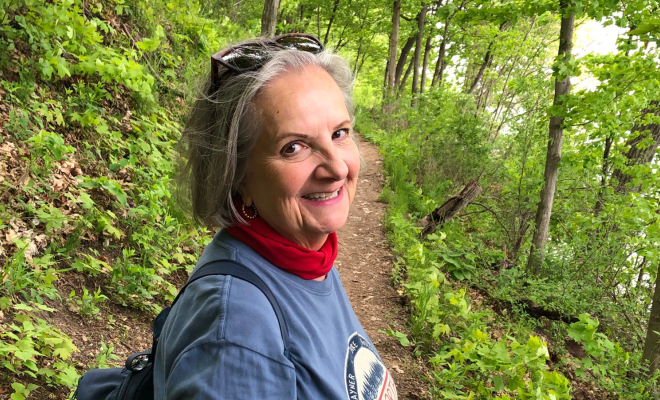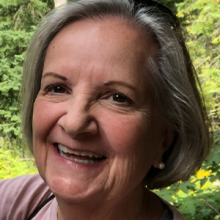Being a senior older than age 65 and getting a late diagnosis of cystic fibrosis is not just a relief because you finally have a correct diagnosis, it's actually beyond comprehension. I have had a cholecystectomy, colostomy, ileostomy, ostomy closure, complete abdominal reconstruction, and recently, cardiac ablation for atrial fibrillation. I have tinnitus, mild hearing loss, and obstructive sleep apnea. I need knee replacement. I have a herniated disc and age-related osteoporosis. I have bronchiectasis, mycobacterium, and MRSA (Methicillin-resistant Staphylococcus aureus) in my airways. And to complete this hellish nightmare, I have late-diagnosed cystic fibrosis. All of these things occurred within the last four years, likely due to CF, although there is no research to prove it.
For most of us seniors just diagnosed with CF, looking back on our lives, we've all known there was something wrong with our health, but we were told there was nothing wrong. Some of us were labeled neurotic because of our belief that something was wrong. When we were kids and had joint pains and dislocations and the X-rays were normal, we were dismissed. Or how about an upset stomach for no reason; nausea or vomiting out of nowhere labeled as car sickness, or something we ate didn't agree with us? Constipation and diarrhea and they would say “Eat more fiber. You'll be fine. Sinus infections are common. It's nothing serious.” As adults, many of us had malfunctioning gallbladders and bouts of pancreatitis and were labeled alcoholics in the ER when we weren't drinkers at all. Yelled at. Lectured to. Eat a healthy nonfat diet. It's all your fault. Eventually we started believing them; maybe there was nothing wrong. Anxiety and depression followed because we knew we didn't feel quite right.
We were the CFers who were dismissed by the medical community. We have been invisible. Until now. Until we were properly diagnosed as seniors.
CF care teams are amazing people. People who are dedicated to improving the quality of lives of people with CF. Even so, treating older adults with CF presents new challenges because we are different. We have unique and complicated needs.
Older adults — with or without CF — come with a host of issues: post-menopausal changes, joint pains, arthritis, slower metabolism, slower reaction times in thinking and speaking, hearing loss, hypertension, heart disease, osteoporosis, unexpected surgeries/recoveries even a variety of cancers that can all lead to depression and sometimes substance misuse.
We are the people that get out of bed in the morning and wonder how we got hurt during the night. Where did this or that pain come from? We are the people that don't quite understand all the technology that's being thrown at us. We are the “fat-free” generation and now we're told to eat fatty foods with our modulator medication. We can't process information as quickly as we used to but the people who treat us speak so quickly and fire questions at us and expect us to answer quickly without allowing those questions to process in our brains that move a bit slower.
As women, we've already been through menopause and even though we feel better now, we've picked up extra weight that is shocking to us, and then we're given medications that cause weight gain and then we are labeled obese. We were kids that played hard outside. We didn't have computers or video games. We were active. We have joint problems now — knees, hips, shoulders, back. We hurt. All the time. Our fingers are starting to become crooked and gnarled, our finger joints swollen with arthritis. We just live with the pain because that's what we're told to do if we don't want to take another daily pill. We have medication boxes to help us remember what medications to take at what time. God forbid if our medications conflict. They give us memory tests several times a year as if measuring memory will determine whether or not we receive a needed procedure. We no longer have career goals — our priorities center around trying to stay healthy and live a good quality of life for the time we have remaining.
Even though most of us older than 60 are retired, our lives are more complicated than you might think. We are quicker to tire and it's difficult to keep up the daily regimen required to keep us healthy. Many of us are alone. Many of us care for partners who are ill and sometimes in nursing facilities.
Nobody warned us. They told us that “getting old was not for sissies” but we didn't believe them. We thought that if we lived healthy lives, maintained a proper diet and exercise routine, that we could escape this. We are all trapped in bodies that we don't recognize. And take note, no one really knows how it feels to be old until they ARE old.
So, the universe said, “Let's further complicate this situation and throw them a rare and expensive chronic illness. Let's see if they can survive this as well.”
With CFTR modulators, for which I am forever grateful, people with CF are living longer and will soon look like the rest of us seniors. By that time, there will be younger doctors and team members caring for us. We will all of a sudden notice that these people look like 12-year-olds, and they care but they don't quite understand how we feel with all of these age-related ailments. Ideally, we need our health care professionals to be seniors.
We need to advocate for more training for all our health care professionals on the topics of age-related illnesses. If we have other specialists and primary care doctors, we need them to become familiar with cystic fibrosis because it's been my experience that they are clueless. My PCP remarked that I have not been sick all my life and my cardiologist said “You're kind of old for this diagnosis, aren't you?” We need all of our doctors to communicate with one another. We need them to read our charts thoroughly. Perhaps it's time for CF teams to add a gerontologist. An increasing number of CFers are going to make it past age 60. Here's to long lives thanks to science. Be well my fellow CF friends. Live long and to the fullest; laugh and be grateful.
Interested in sharing your story? The CF Community Blog wants to hear from you.





